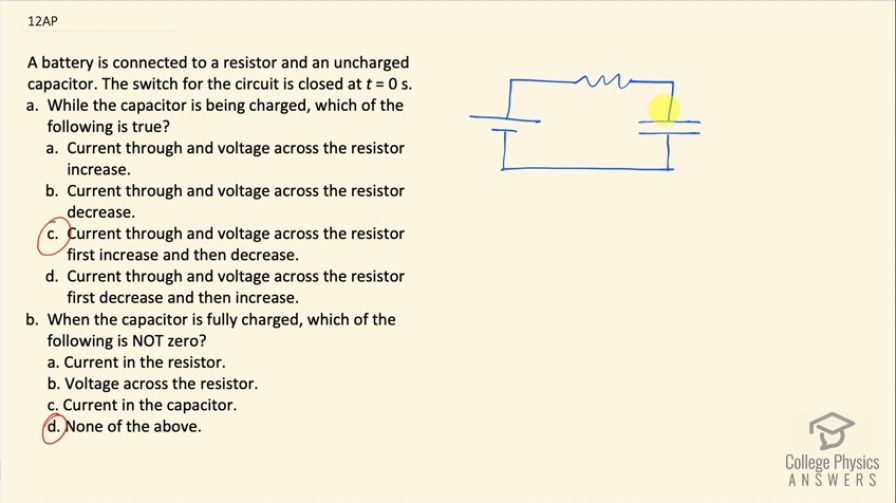Question
A battery is connected to a resistor and an uncharged capacitor. The switch for the circuit is closed at t = 0 s.
-
While the capacitor is being charged, which of the following is true?
- Current through and voltage across the resistor increase.
- Current through and voltage across the resistor decrease.
- Current through and voltage across the resistor first increase and then decrease.
- Current through and voltage across the resistor first decrease and then increase.
-
When the capacitor is fully charged, which of the following is NOT zero?
- Current in the resistor.
- Voltage across the resistor.
- Current in the capacitor.
- None of the above.
Final Answer
- (c)
- (d)
Solution video
OpenStax College Physics for AP® Courses, Chapter 21, Problem 12 (Test Prep for AP® Courses)

vote with a rating of
votes with an average rating of
.
Video Transcript
This is College Physics Answers with Shaun Dychko. A battery is connected to a resistor and a capacitor and initially the capacitor is not charged and then a switch for the circuit, which I didn't draw but, you know, you can imagine there's a switch here... it is open then it is closed and after being closed, given an initially uncharged capacitor, which of the following is true? The current and the voltage across the resistor will initially increase when the switch is closed because with the switch open, there's no current flowing at all and there's no voltage therefore across the resistor since the voltage across a resistor is the current times its resistance and with no resistance, with the switch the open before t equals zero, there's no voltage so when the switch is closed, there will be some current... it will flow as though the capacitor is not even there in the first instant since the capacitor is not yet charged and there will be lots of current initially and there will be a large voltage across the resistor but with time as the capacitor becomes charged, there will be less current flowing through it and so the voltage therefore will be decreasing with time across the resistor as well as the current decreasing with time so the answer is (c). When the capacitor is fully charged that means there is no current flowing at all so there's no current in the capacitor and therefore no current in the resistor and since the voltage across the resistor is proportional to current being no current, there will be no voltage either so the answer here is none of the above because all these things are zero.